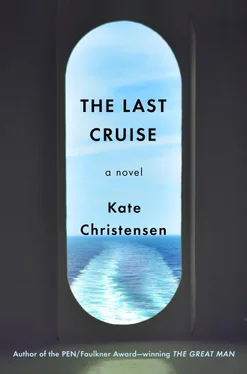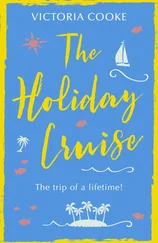“I can’t remember when I last ate anything.” Valerie sat on her bed, opened her notebook, and began scribbling notes.
“You need to eat,” said Christine.
“Yeah,” said Valerie absently.
“Can I bring you some food?”
Valerie didn’t answer. She didn’t even look up as Christine walked out.
When she got to the galley, Mick was already there, his cheeks stubbled, dark hair standing up in tufts. No one else was around yet. He looked bleak and tired, but seemed to brighten as soon as she came in. He handed her a warm can of Coke. She popped it open and took a swig as they stood shoulder to shoulder, aiming their flashlights into the pathetically empty storeroom. For the first few nights, they had grilled whatever they could on the braziers. All the fragile perishables had been used up, along with the sturdier fresh food, the potatoes and onions, eggs, apples and carrots. Now, the oats and nuts were gone. They had plenty of rice and pasta and polenta, but no way to cook them. Yesterday, they had run out of bread after using up all the stacked cases of thawed frozen loaves.
“These cruise ships don’t give you much extra,” said Christine. “It’s lucky there’s an airdrop coming.”
“How about raw cornmeal mush with sugar? There’s maybe enough for two days. And after that, wheat flour mush with sugar.”
“Well, there’s plenty of sugar.” They stared at the two enormous bags, unopened. “And oil,” she added, looking at the three ten-gallon drums. “We can mix oil with sugar, I guess.”
“With maraschino cherries,” said Mick. “Two cases. I don’t know why. We also have capers.”
“Hey. There must be some rats on board, right? Don’t all ships have them?”
“Rat tartare with capers,” he said without missing a beat.
They had been flirting in the past couple of days, enjoying the easy attraction that fizzed between them as if it were their mutual reward for working so hard.
“The trick is to catch them,” said Mick.
“I’m pretty sure I can think like a rat. I know I could eat one. I’ve eaten squirrel stew before, and it was actually pretty tasty. If it comes down to starving or eating a rat, it’s not even a choice.”
Mick’s laughing eyes caught hers in the sharp light of the electric torches.
Their gaze held a moment too long, on purpose, before they went off to see about lunch.
An hour or so later, as they were putting together a sorry meal of scraps, Christine heard Valerie’s voice coming from the gloom near the swinging doors.
“Christine. Where are you?”
“I’m over here,” Christine called out.
She turned to see Valerie standing at the end of the prep station. “Come upstairs with me,” she said. “There’s a party going on, some people hanging out.”
“Oh. I’m okay here,” said Christine.
“Come on, you need some fresh air. Hey, Chef, can she take the day off?”
“She can do whatever she wants,” said Mick, who was going through a box of spices at the end of the counter.
“Want to come with us, Chef? You look like you could use a drink.”
“I have to make lunch,” Mick said.
“What’s on the menu today?”
“Irish tea crackers and peanut butter,” he said.
“Mmm,” she said, smacking her lips, flirting with him. “Sounds delicious.”
Christine felt churlishly glad when Mick turned away from Valerie and moved down the counter.
Passing the open entryway to the bridge, Miriam caught sight of Kimmi sitting behind the steering console. She was swiveling her chair back and forth with one foot on the ground, the other tucked up underneath her hip, staring straight ahead through the windows, although there was nothing but the static shock of brightness outside. Two young crewmen in rumpled white uniforms stood on either side of the room, flanking her, looking out at the horizon.
“Nothing,” Kimmi said, without turning her head as Miriam went in to stand next to her. “Not even a seagull. Gosh, it’s empty out here.”
“Where’s the captain?” said Miriam.
“Sick,” said one of the crewmen. “He’s in the infirmary. Along with most of the bridge crew.”
“It’s norovirus,” said the other crewman. “This thing is bad.”
Miriam shook her head. “We’re cursed,” she said. “The fire, then this norovirus. And half the crew quit.”
“Trouble comes in threes,” said Kimmi somberly.
“I hope that means there won’t be any more of it,” said Miriam.
One of the young officers bestirred himself, looked across the bridge at the other one. “As long as there’s no storm,” he said. “As long as they get here in time.”
Miriam felt a cold grip of dread in her chest. A storm would be very, very dangerous without propulsion or navigation. The Isabella would be helpless.
“So they’re letting me hang out in this chair,” said Kimmi. “I’m keeping watch for any sign of life out there. That’s my job right now.”
When Kimmi turned, Miriam was shocked: her eye sockets were hollow, her heart-shaped face a puzzle of hard planes. Her lips looked painfully chapped, dusted with dried salt from the air.
“Have you seen anything?”
“Not one thing,” said Kimmi. “No plane, no ship, nothing but floating garbage.”
Miriam looked out with her. Far below, on every side, the ocean ran ceaselessly on, a vast, slow system with its own pulses and energy and no land to interrupt it for a thousand miles or more.
“At least the garbage gives us something to look at besides water,” said Miriam.
Kimmi gave a small, dry laugh. “I’m glad you came in. Eduardo and Ivan and I have run out of things to say to each other. Right, guys?”
Miriam looked at the two young officers. The port one was short and dark and moonfaced, the starboard one tall and blond and long-faced. She recognized them, but only vaguely. “I’m Miriam, by the way,” she told them. “I’m a violinist with the string quartet.”
“Eduardo,” said the tall fair one. “Safety officer.”
“Ivan,” said the short swarthy one. “Deck cadet.”
“Last men standing,” said Kimmi. “The senior officers are all sick, so these boys have the bridge, what’s left of it.”
“Maybe you should give yourselves promotions,” said Miriam.
“Oh no,” said Eduardo earnestly. “We can’t do that.”
“This is only my first year,” said Ivan.
“They can’t even joke about it, God bless ’em,” said Kimmi. “It’s no fun at all. They’re fine with me sitting in the captain’s chair and pretending I’m in charge, but they won’t let me call them my staff captain and first officer. The guys on night watch are just as bad. Sticklers for protocol. Cabaret trains them to be as loyal as soldiers.”
“Why are no other Cabaret ships coming to help us?” Miriam asked. “Or anyone?”
“There’s no one else out here,” said Ivan. “This California-to-Hawaii route isn’t well traveled, not by cruise ships or container ships or tankers, not even airplanes. Cabaret doesn’t do this route very often. This cruise was special.”
Miriam cleared her throat to steady her voice. “So why doesn’t the U.S. Navy send a carrier ship to pick us all up? Why doesn’t another Cabaret ship come and get us?”
Ivan and Eduardo exchanged a look, as if they were trying to gauge how much to reveal.
“I want the truth,” said Miriam. “Please. I can take it.”
“There’s an old saying,” said Eduardo. “ ‘The safest ship is the one you’re already on.’ ”
“ ‘The safest ship is the one you’re already on,’ ” Miriam repeated. “You mean it’s dangerous to move people from one ship to another?”
Читать дальше












